Concrete Noun DefinitionA concrete noun is an individual, object, or location that can be seen with one of the five senses. These nouns are both physical and non-abstract. A concrete noun can be described as "the name of an object that can be experienced by one or more of the five senses." A chicken, a tasty cookie, your favourite hat, a computer all these are a concrete noun. 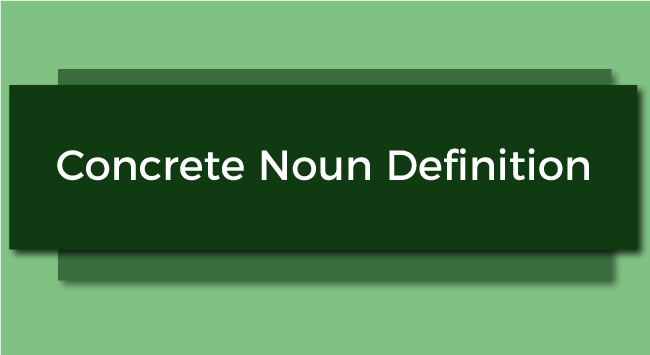
What Exactly Is a Concrete Noun?A concrete noun is one through which we are able to experience with our five senses: smell, sight, hearing, touch, and taste. Things and substances that we cannot perceive (see, hear, taste, touch, or smell) using our sensory organs aren't concrete nouns. A large number of nouns become concrete nouns when we can feel them (for example, all animals and people). Concrete nouns can be common nouns, countable nouns, proper nouns, uncountable nouns, collective nouns, and so on. 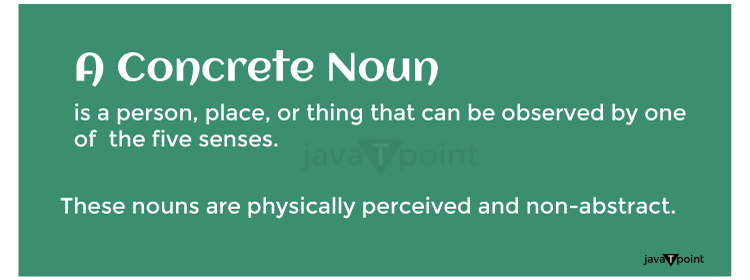
They are also available in singular and plural variants. Flowers, music, bears, cake, hurricane, ranch, town, milk, waterfall, hockey team, cream, stellar objects, water, learners, fire fighter, pen, computer, candles, plates, tree, wolf, bang, clouds, panda, the sun sets, cloves, rain, biscuits, car, and so on are instances of concrete nouns. Concrete nouns that can be counted can have both singular and plural forms, such as: Concrete nouns that can be counted (in singular form): a block, a chicken, a pony, a text book, a sheep, a kitty, a house, a buddy, a room, a loaf of bread, and so on. Two blocks, three novels, two sheep, two cats, three buddies, four donkeys, three bedrooms, two breads, and so on are countable concrete nouns (plural form). Uncountable concrete nouns have no plural form since they cannot be split into discrete pieces to count, such as: Uncountable concrete nouns: air, milk, flour, legumes, salt, glucose, wood, gas, water, grain flour, and so on. Concrete nouns are different from abstract nouns, which are phrases like "gentleness" that describe concepts that cannot be perceived immediately with the senses. As an example:
Here are some more examples;
Concrete nouns can be either common nouns that allude to a general person and are not capitalized (such as cat) or proper nouns which refer to a certain person and must be capitalized (such as Innova). Concrete Vs Abstract NounConcrete nouns are distinguished from abstract nouns by the things they explain. Let us understand this in detail;
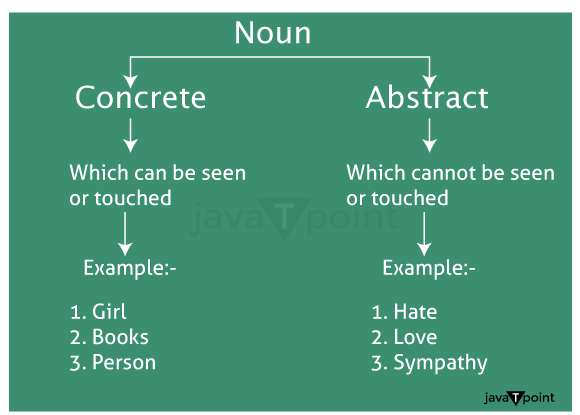
Concrete and abstract nouns are two examples.
(Here highlighted words are concrete noun and underlined are the abstract nouns) In many cases, the same term might be deemed abstract in one sense and concrete in another. Consider terms that have separate literal and metaphorical meanings. Nouns that can be concrete or abstract, for example.
Note: There is no grammatical distinction between concrete and abstract nouns. The goal is simply to demonstrate the various types of objects that nouns may allude to. Language authorities (e.g., dictionaries) typically overlook the categories since they are highly subjective.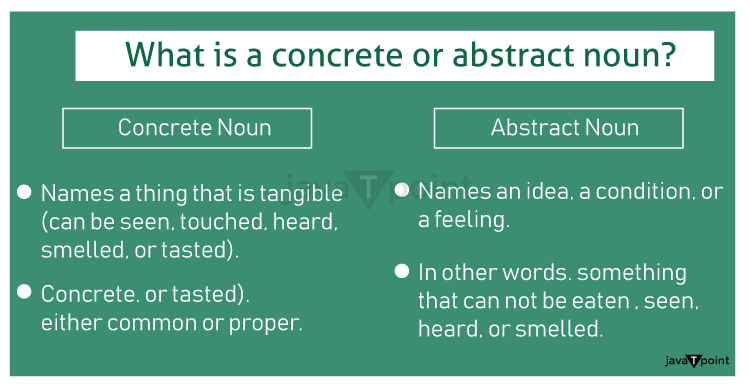
Examples of Concrete Nouns by SenseThere are concrete noun examples all around. Although most of them can be experienced with a variety of senses (For instance, cakes can be seen, smelled, tasted, and felt), they are organized below by their primary sense. Concrete Nouns for SightThese concrete nouns are evident whether they are items in the workplace or creatures mentioned in a book. Here are some examples of the same;
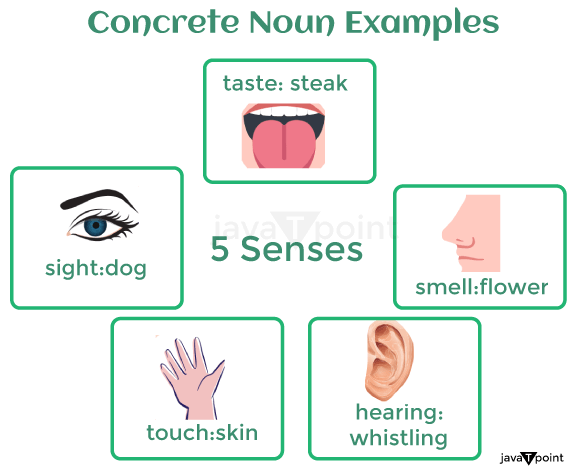
Concrete Nouns for HearingCan you hear it? It's the sounds of concrete nouns resonating in the environment. Here are some examples of the same;
Concrete Nouns for TouchA concrete noun is one that can be felt with physical touch rather than feelings. Here are some examples of the same;
Concrete Nouns for SmellSome concrete nouns smell amazing while others do not. Here are some examples of the same;
Concrete Nouns for TasteAlthough you must not try to taste every concrete noun, you can precisely explain the ones that do. Here are some examples of the same;
Why Are Concrete Nouns Essential?If you create verse (e.g., poetry, song lyrics), here's a great suggestion about concrete nouns. (This is a great tip to consider!) Write poetry with concrete nouns rather than abstract ones. Despite the fact that poets frequently address abstract noun concepts (e.g., love, loneliness), they typically use concrete nouns to express their ideas, believing that abstract nouns as well as their derivatives (e.g., we were experiencing love, she was feeling alone) tell their readers barely anything about their subjects. The challenge for poets is typically to portray these abstract feelings with concrete examples. The metallic lead that swings inside a door is no longer required, and the dish still scratches the tiled floor when tapped by foot rather than paws. (Poets like to employ concrete nouns to convey the feeling of an abstract noun, in this case loss.) Remember that a noun's significance, rather than its grammatical function, determines whether it is concrete or abstract. In other words, concrete and abstract nouns function grammatically in a similar way. How to Effectively Use Concrete NounsEffective use of concrete nouns can help you express what you're thinking and feeling more clearly and precisely. Here are a few suggestions for efficiently employing concrete nouns:
Common Concrete Noun Mistakes To AvoidWhile concrete nouns are necessary for efficient communication, there are several common errors to avoid. Here are some examples of standard concrete noun mistakes:
ConclusionConcrete nouns are essential aspect of English Grammar. We learn to identify items and people around us by their specific names as kids. Concrete nouns are the linguistic building pieces that depict concrete things that can be seen, touched, or felt. We would struggle to communicate and describe our reality without concrete words.
Next TopicAccounting Standards Definition
|
 For Videos Join Our Youtube Channel: Join Now
For Videos Join Our Youtube Channel: Join Now
Feedback
- Send your Feedback to [email protected]
Help Others, Please Share









